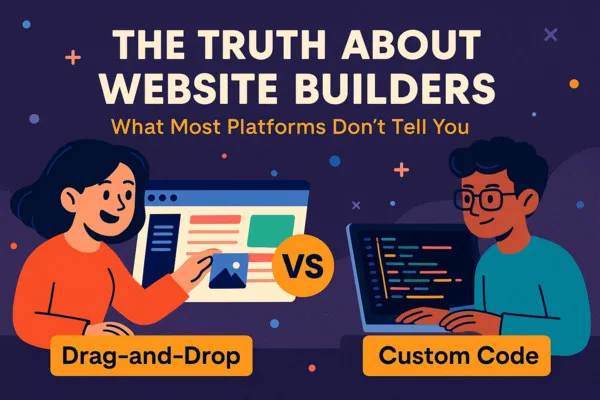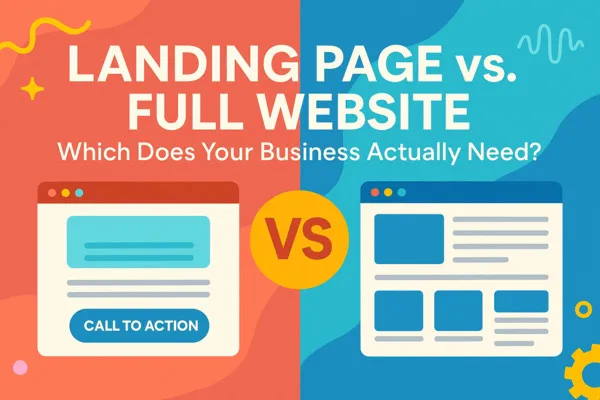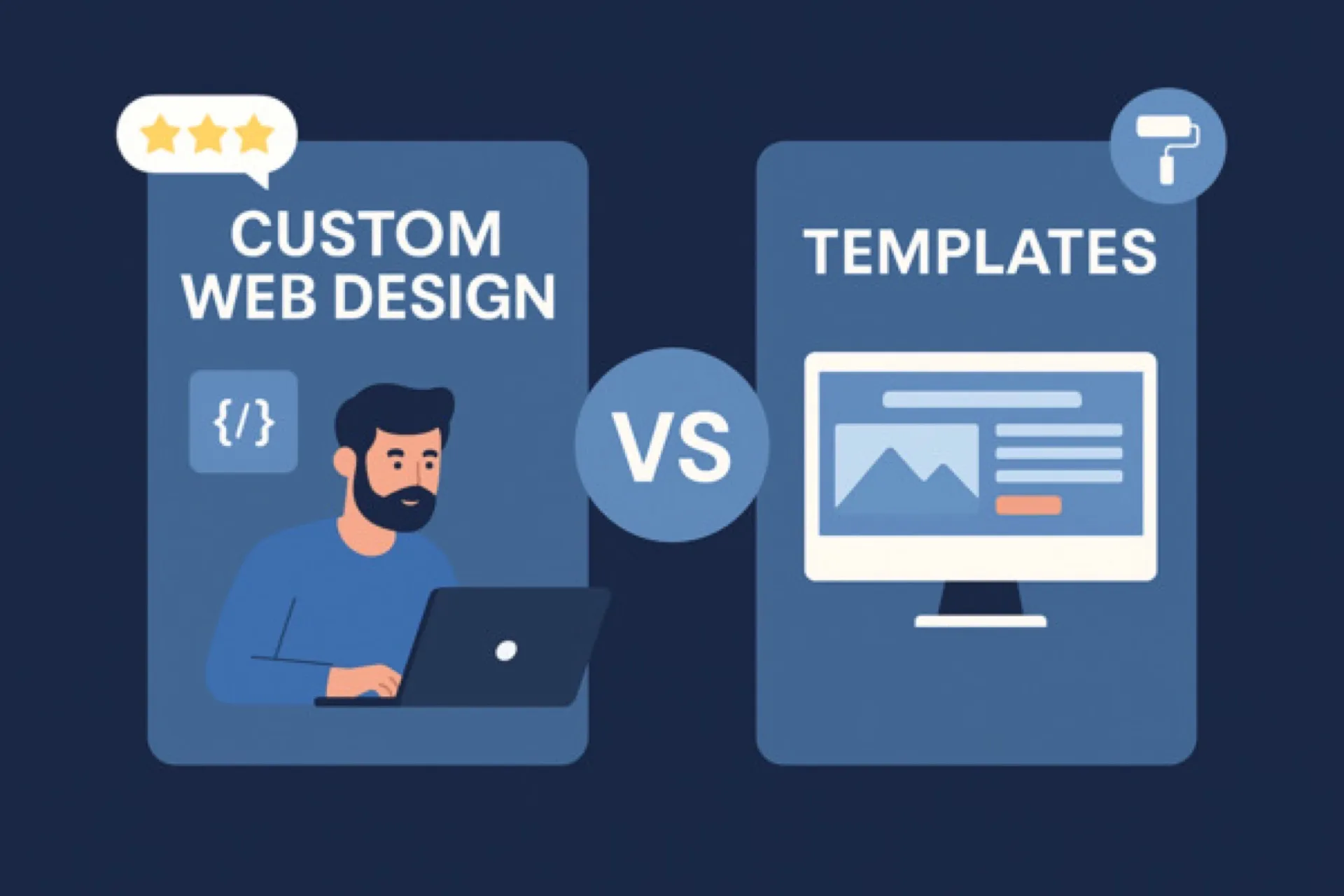Website builders promise the world: drag, drop, launch. But if you've ever used one, you know it's rarely that simple. As professional web designers, we've worked with businesses who started on Wix, Squarespace, Webflow, Carrd - and ran into real limitations that no one talks about until it's too late.
In this post, we'll explore the truth about website builders, comparing them with custom-coded sites, and showing you what to consider before you commit to your platform. Whether you're a founder, marketer, or small business owner, this guide will help you make a smarter decision - one that won't leave you stuck six months from now. If you're considering a bespoke build, see our web design services and portfolio. London, Manchester, or Kelowna based? Explore our London web design, Manchester web design, and Kelowna web design pages.
1. The Website Builder Pitch - And Why It's So Tempting
Website builders like Wix, Webflow, Carrd, and Squarespace market themselves as fast, cheap, and code-free. And to be fair, they are incredibly easy to get started with. You pick a template, drag some blocks, add your logo, and boom - you're online.
The pitch: You don't need a developer. You don't need to learn HTML. Just sign up and build.
But fast and easy often comes at a cost - and we're not just talking money.
3. Templates vs Branding: Why Your Site Still Looks Like Everyone Else's
One of the biggest limitations of website builders is their heavy reliance on pre-built templates. Sure, they look slick. But so do thousands of other websites using the exact same one.
Custom branding? Hard to pull off unless you know CSS.
Unique layouts? You're working within the grid.
With custom code or pro help, you control every pixel. You get a site that actually looks and feels like your brand, not just another template with your logo slapped on. See examples in our recent work.
4. SEO Limitations (That Hurt You Long-Term)
Let's get real: SEO is not about just adding keywords. It's about structure, speed, semantic HTML, clean markup, crawlability - all the stuff builders often gloss over.
Many drag-and-drop platforms:
- Don't let you edit key meta tags fully
- Produce bloated code that slows down your site
- Offer limited access to things like alt tags, structured data, or sitemap control
If Google can't understand your site clearly, or if it loads slowly, your rankings suffer. Custom-coded sites - or even lightweight HTML/CSS pages like those generated by Futurelab's AI tool - give you cleaner, faster output.
5. What Happens When You Outgrow the Platform?
This is a big one. You start with a builder because you're testing an idea. But then you gain traction. You want custom features. Maybe an app. Maybe an integration.
Then you realise:
- You can't export your content easily
- You're locked into their CMS
- You can't move your design elsewhere without rebuilding from scratch
That means time lost, SEO lost, momentum lost.
With custom code, your site is portable. You own your stack. You can evolve without being trapped.
6. Performance Matters More Than You Think
Users bounce fast. If your site takes more than 3 seconds to load, most visitors leave. Unfortunately, most website builders produce code that's bloated, messy, and dependent on multiple scripts loading at once.
This leads to:
- Slower page speed scores
- Lower conversions
- Worse user experience
Custom-coded sites, on the other hand, can be built to load in under a second. At Futurelab, we routinely deliver sub-1.5s load times - and you feel the difference immediately.
7. Accessibility and UX: Often an Afterthought
Modern websites should be accessible. That means readable by screen readers, navigable by keyboard, and usable for everyone. But many website builders:
- Don't meet accessibility standards out of the box
- Lack semantic markup for proper screen reader support
- Offer poor contrast or hidden navigation when customising
With a custom build, accessibility can be baked in - not slapped on.
8. The Truth About "No Code" Flexibility
"No code" is amazing until you need something that isn't in the UI. Then what?
Want to animate one block but not another? Need custom JS? Good luck.
Want to display different content to logged-in users? Usually not possible.
Want to build something outside the template grid? Better learn CSS.
This is the dirty secret: Most website builders are fine - until you want to do anything interesting. That's when their limits show.
9. Security, Backups, and Future-Proofing
Platforms like Wix and Carrd manage security for you - that's great. But it also means:
- You don't control when backups happen
- You can't restore a single file or revision
- If the platform shuts down or changes pricing, you're at their mercy
With your own site (especially hosted static HTML/CSS), you can version-control your content, back it up manually or with Git, and move hosts freely.
10. When Website Builders Are the Right Choice
We're not against website builders - in fact, they're perfect for:
- Simple one-page sites
- MVPs or temporary campaigns
- Non-technical founders on a budget
If you need to get something up right now, tools like Carrd or even your AI-generated landing pages are a smart, strategic choice. Just know their limits - and be ready to upgrade when you outgrow them.
11. Why Custom Builds (or Hybrid Setups) Win Long-Term
Custom websites don't mean "expensive from day one." They mean scalable, optimised, fast, and unique. You don't have to go full dev-mode, either - at Futurelab, we often blend:
- AI-generated landing pages (from our tool) for speed
- Light CMS integration (Notion, Sanity, or simple admin panels)
- Clean, hand-coded sites for performance and SEO
That way, you get the speed of a builder with the control of custom code.
12. Conclusion: Know What You're Signing Up For
If you're just testing an idea - by all means, launch fast. But if you're serious about your brand, traffic, and growth - don't get locked into a platform that can't grow with you.
Website builders are tools. Like all tools, they work best when used for the right job.
At Futurelab, we help businesses go from "drag and drop" to "design and dominate" - with performance-first sites, smart strategy, and scalable solutions.
🚀 Try our AI generator for a fast launch
📞 Or get in touch if you're ready for a custom site that actually grows with your business.


